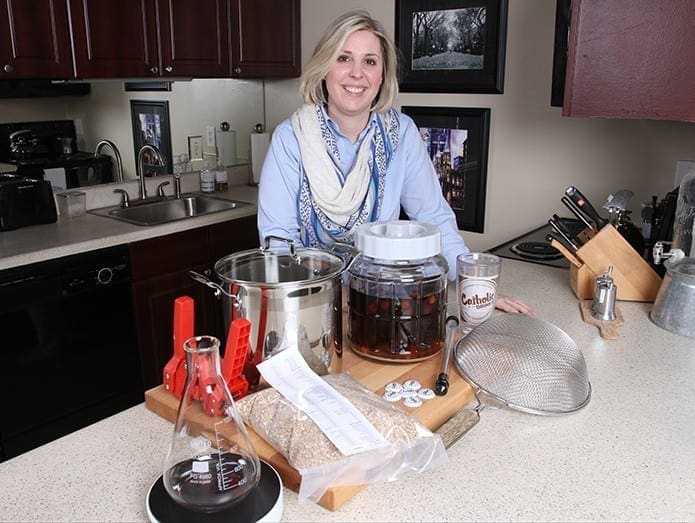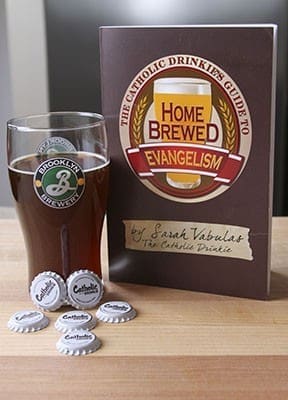 Photo By Michael Alexander
Photo By Michael AlexanderAtlanta
‘Catholic Drinkie’ blends faith and spirits in unique book on brews
By ANDREW NELSON, Staff Writer | Published July 23, 2015
ATLANTA—In the summer heat, how about a Mary Magdalene Watermelon Wheat to take the edge off? Or perhaps a Pope Benedict in Retirement?
These are home-brew recipes found in the book “The Catholic Drinkie’s Guide to Homebrewed Evangelism.” First-time author Sarah Vabulas—who goes by the moniker of Catholic Drinkie—mixed her passion for her faith with a good drink. Her website’s tagline is “Where faith meets brew.”
Vabulas, a lector and participant in a women’s Bible study at the Cathedral of Christ the King, offers an offbeat look at the crossroads of Catholic faith and spirits, from drinking in Scripture and patron saints of beer to small-batch home-brewing. To prove that she knows what she’s talking about, she’s got a Sour Cherry Tripel aging in a carboy in her pantry.
The book is published by Liguori Publications, a ministry of Redemptorist priests and brothers. Sections include the history of alcohol and the Catholic Church, beer-brewing monks, evangelizing, building community through home-brewing, and home-brewing recipes and guidance.
“Your life doesn’t have to be separate. Your Catholic faith should be a part of everything you do. And we shouldn’t hide that,” said Vabulas in her Buckhead apartment. “Why can’t you take a hobby like home-brewing and make it something that God is involved with?”
The 31-year-old, a graduate of St. Mary’s College at Notre Dame who launched Catholic Drinkie in 2010 as a blog and podcast, spoke with The Georgia Bulletin about her new book.
“It’s a book about faith, the beer-brewing monks, St. Arnulf, St. Brigid, a lot of the saints that had something to do with evangelizing with alcohol. I did a whole chapter on the wedding of Cana because you can never forget that Jesus’ first miracle was turning water into wine because Mary told him so,” Vabulas said.
Ponder this: Beer saved the world during the plague.
She said, “People couldn’t drink water so our Catholic monks brewed beer and gave it out for free to people so they could have something safe to drink because water was not safe and killing people.”
GB: What was your first drink?
SV: I think it was a Lemon Drop when I was 18 and with my parents in the Cayman Islands. As a child I remember vaguely taking sips of my dad’s Coors Original and thinking it was really cool that my dad would let me have a sip of his beer.

Sarah Vabulas’ new book, “The Catholic Drinkie’s Guide to Homebrewed Evangelism,” is displayed next to her home-brewed version of bourbon dubbel style beer. Half of the book is devoted to faith and evangelization and the other half teaches readers how to home brew. Photo By Michael Alexander
GB: Why did you want to write about the Catholic faith, beer and libations?
SV: It was an opportunity to write about the things I think are the coolest about the history of alcohol and the Catholic Church and about home-brewing. And some of the great stories of my interactions with people along the way.
Why can’t you take something like beer, that is very popular right now, and bring people into the faith through it by starting conversations and building relationships and maybe from there introducing them to Jesus.
GB: Can you give me an example?
SV: I like to go around and drink beers at some of the bars. There’s a lot of people there who don’t believe in God, who don’t believe in anything. Yet we all have that common ground of beer. We are at these events and everyone wants to know, Why are you here?
(Vabulas says:) I’m a beer blogger.
Oh, what’s the name of your blog?
(Vabulas says:) I tell them, Catholic Drinkie.
They are like, wait, you’re religious? You kind of seem normal. How can you be religious, yet among us. This has nothing to do with God.
(Vabulas says:) It does. It has everything to do with God. Yeast is a living being and I believe God created everything. God created yeast. Because of yeast, we can have beer. Plus, the number one beer in the world is made by Trappist monks in Belgium. It is rated on Beer Advocate, Ratebeer.com, year after year, the number one beer in the world.
GB: Alcohol and faith, is that mixing the sacred and the profane?
SV: I don’t think alcohol is profane by any means. We use wine in the Mass. It is only profane if you make it profane. Obviously, moderation is extremely important with everything you do, from eating, to drinking, to whatever—moderation.
GB: Tell me how it teaches about faith?
SV: We need to figure out different ways to keep young adults engaged. Why can’t we use things that people like, like craft beer, wine, good mixed drink, and use it as a way to lure people in to learn more about the faith?
It is not necessarily about the alcohol itself so much as the opportunity that it can give you because you are in a safe place, enjoying something together. Food can do the same thing. It’s the reason why people love to share meals with others.
GB: Who is the audience for this book?
SV: I’d love to get my friends, my colleagues, who were raised Catholic but are not Catholic anymore, don’t consider themselves (Catholic), in some way show them the beauty of the church through this. Or those nominal Catholics, who kind of know the faith, but don’t go to church every Sunday and say the church doesn’t get me.
Well, I get them. I want to show them that there is more to it than all of these rules. That’s where a lot of people are stuck lately. They just view the church as no, no, no. I want my book to be a real big yes to something a lot of people didn’t know about before.
GB: Tell me stories of saints.
SV: My favorite story is St. Arnulf of Metz, whose feast day is coming up, Saturday, July 18. He died and the miracle he was canonized for was that the people from his hometown didn’t want him to be buried up at the monastery where he passed away. They decided to go and get his body and bring it back to their village. It is in France, back in the late 500s. It’s a long trip. On the way to go get him, they stopped in a town overnight and they wanted to go to the pub and have a drink. There was only one glass of beer left. One of the folks going to get St. Arnulf said a prayer. Well, the barrel never ran dry and they had extra beer that they were able to carry along with them on the journey. It is really cool that’s an actual miracle that the Catholic Church recognizes. Being Catholic does not mean being stuffy.
GB: Tell me how alcohol is used in the Bible.
SV: In the Old Testament, you first have Noah, who is attributed as being the first one that laid vineyards. That’s one of the first things after the flood; he built a vineyard, obviously important at the time.
Furthermore, in the Jewish Passover meal, wines are used. Wine plays a huge role in all the big Jewish meals and in the life of being a Jew back when Jesus was walking. It was at no point a surprise that Jesus used wine in the Last Supper.
Also, St. Paul tells Timothy to have a glass of wine for a stomachache. St. Paul thankfully reminds us of moderation because the Corinthians, the Ephesians, the Romans, people were overindulging. That’s why there’s a lot of that in the New Testament.
GB: And the wedding at Cana?
SV: It’s a beautiful story because it’s a wedding for a man and a woman. Jesus and Mary were invited to the wedding. Here he is at this wedding and the poor bride and groom run out of wine and the party’s not over. At this point in time, it would have been very embarrassing to have this happen. Mary noticing this, without direction from anyone else, turns to Jesus, and says, Jesus, make some wine, turn this water into wine. Jesus wasn’t crazy about doing that, but upon Mary asking him again, he said yes. So, you have to imagine it was probably the best wine ever created on earth. We can take joy in the fact these people had a beautiful wedding because of something our Lord did.
GB: Half the book is stories about faith and what is the other half?
SV: I have about 25 home-brew recipes. They are my recipes I made up. My favorite is a lemon mint pale ale. I wrote that for my friend’s cookbook about Mediterranean and Middle Eastern food. I wanted to really use this beer to pair it well with that kind of food. It is really refreshing, great for the summer and really approachable.
I’ve had people who don’t like beer tell me they actually like this one. People who say I don’t like beer, I say, that’s because you haven’t had the right beer.
I name all the beers after a saint or something within the church. I have one in here for G.K. Chesterton, one for Pope Benedict. I’ll figure one out for Pope Francis, but he doesn’t drink so I’ll have to do something interesting. He just likes his tea.
“The Catholic Drinkie’s Guide to Homebrewed Evangelism” can be purchased at Liguori Publications and on Amazon.